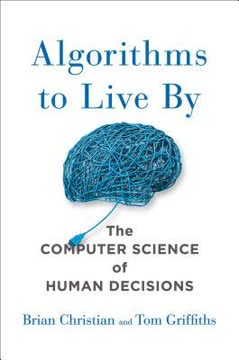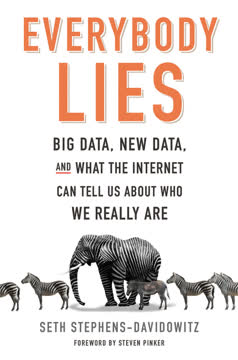Key Takeaways
1. Algorithms are revolutionizing financial markets and beyond
Algorithms allow us to squeeze more and more into our days.
Algorithmic takeover. Algorithms have transformed financial markets, with over 60% of all trades now executed by computers. This revolution began on Wall Street but has spread to various aspects of our lives. Algorithms now influence everything from music composition to medical diagnostics, reshaping industries and decision-making processes.
Widespread impact. The power of algorithms extends beyond finance:
- Customer service: Bots analyze conversations to improve satisfaction
- Healthcare: Algorithms assist in diagnoses and treatment plans
- Transportation: Self-driving cars use complex algorithms for navigation
- Entertainment: Streaming services use algorithms for personalized recommendations
As algorithms become more sophisticated, they are increasingly able to perform tasks once thought to require human intuition and creativity.
2. The evolution of algorithmic trading on Wall Street
To trade is to dig.
Peterffy's innovation. Thomas Peterffy pioneered algorithmic trading on Wall Street in the 1980s. He developed a system that could automatically analyze market data and execute trades faster than human traders. This innovation gave him a significant advantage in the markets and paved the way for future developments in algorithmic trading.
Spread Networks. The quest for speed in algorithmic trading led to extreme measures:
- Construction of a secret fiber optic cable between New York and Chicago
- Reduced latency by milliseconds, providing a crucial edge in high-frequency trading
- Demonstrated the lengths traders would go to gain an algorithmic advantage
The evolution of algorithmic trading has fundamentally changed the nature of financial markets, making them faster, more complex, and increasingly dominated by computer-driven strategies.
3. Algorithms are transforming music composition and analysis
Cannot the fervor / Over the river's ending / Be postponed to now?
AI composers. David Cope's work on algorithmic music composition has shown that computers can create music indistinguishable from human-composed pieces. His algorithms, such as EMI and Emily Howell, have produced works in the style of classical composers and original compositions.
Music analysis. Algorithms are also being used to analyze and understand music:
- Identifying patterns and structures in compositions
- Predicting hit songs based on musical characteristics
- Unraveling mysteries in famous works, like the Beatles' chord progressions
These developments challenge our understanding of creativity and raise questions about the future of human composers in an increasingly algorithmic world.
4. Medical diagnostics and organ matching are being revolutionized by algorithms
Machines run on binary mathematics. Human's don't.
Improving diagnostics. Algorithms are enhancing medical diagnostics by analyzing vast amounts of data and identifying patterns that humans might miss. This has led to:
- More accurate cancer detection in medical imaging
- Faster and more precise interpretation of test results
- Personalized treatment plans based on individual patient data
Organ matching. Tuomas Sandholm's work on kidney exchange algorithms has dramatically improved the efficiency of organ donation systems. By using complex algorithms to match donors and recipients, more lives are being saved through increased transplant opportunities.
These advancements demonstrate the potential for algorithms to improve healthcare outcomes and save lives by augmenting human decision-making in complex medical situations.
5. Algorithms are changing how we understand and categorize human personalities
We are categorizing the human language.
NASA's personality assessment. Terry McGuire developed a system at NASA to categorize astronauts' personalities and predict their behavior under stress. This work laid the foundation for algorithmic personality assessment in various fields.
Modern applications. Today, algorithms analyze speech patterns and written communication to:
- Match customers with compatible customer service representatives
- Improve team dynamics in workplaces
- Enhance online dating matches
- Predict consumer behavior for marketing purposes
These developments raise both opportunities and concerns about privacy and the ethical use of personal data in algorithmic decision-making.
6. The shift of top talent from Wall Street to Silicon Valley
It used to be if you went to Harvard or Yale, you wanted to be a finance titan. But now everybody wants to be a Zuckerberg.
Talent migration. The 2008 financial crisis and the rise of tech giants like Facebook and Google led to a shift in where top engineering and mathematical talent chose to work. Many bright minds who once would have gone to Wall Street are now drawn to Silicon Valley.
Impact on innovation. This shift has implications for innovation and economic growth:
- More talent focused on solving real-world problems through technology
- Increased entrepreneurship in the tech sector
- Potential for more diverse and impactful applications of algorithmic thinking
The movement of talent from finance to tech reflects changing priorities and opportunities in the algorithmic age.
7. The future belongs to those who can create and manipulate algorithms
Get friendly with bots.
Skills for the future. As algorithms become more prevalent in various industries, the ability to create, understand, and work with them will be increasingly valuable. This trend highlights the importance of:
- STEM education, particularly in computer science and mathematics
- Developing critical thinking and problem-solving skills
- Fostering creativity in conjunction with technical knowledge
Ethical considerations. The growing power of algorithms raises important ethical questions:
- Privacy concerns in data collection and analysis
- Potential for algorithmic bias and discrimination
- The need for transparency and accountability in algorithmic decision-making
As we move further into an algorithm-driven world, it will be crucial to balance the benefits of these technologies with careful consideration of their societal impacts.
Last updated:
FAQ
What's Automate This: How Algorithms Came to Rule Our World about?
- Exploration of Algorithms: The book by Christopher Steiner explores how algorithms have taken control of various aspects of life, particularly in finance and technology.
- Real-World Examples: It uses examples like the Flash Crash of 2010 and Amazon's pricing algorithms to show the power and pitfalls of algorithmic decision-making.
- Impact on Society: Steiner discusses the broader implications of algorithms on jobs, creativity, and human decision-making, emphasizing the need to understand their influence.
Why should I read Automate This by Christopher Steiner?
- Insight into Modern Technology: The book provides valuable insights into the technology shaping our daily lives, especially in finance and commerce.
- Awareness of Risks: It raises awareness about the risks of algorithmic decision-making, such as market crashes and loss of human oversight.
- Engaging Narrative: Steiner presents complex topics in an engaging manner, making it suitable for both tech enthusiasts and general readers.
What are the key takeaways of Automate This?
- Algorithms Are Everywhere: Algorithms have infiltrated nearly every aspect of modern life, from stock trading to online shopping.
- Human Oversight is Crucial: The importance of human oversight in algorithmic processes is emphasized to prevent unintended consequences.
- Future of Work: The rise of algorithms threatens traditional jobs, and those who understand them will have an advantage in the job market.
What are the best quotes from Automate This and what do they mean?
- “The machine obviously broke...”: Reflects the chaos during the Flash Crash, highlighting the need for human intervention in automated systems.
- “Algorithms can and will do strange things.”: Underscores the unpredictable nature of algorithms without human oversight.
- “The future belongs to the algorithms...”: Emphasizes the growing importance of algorithmic literacy in a technology-driven world.
How did algorithms change Wall Street according to Automate This?
- Rise of Algorithmic Trading: Algorithms have enabled high-frequency trading, increasing market efficiency but also volatility.
- Displacement of Human Traders: Machines can analyze data and execute trades faster than humans, raising concerns about job security.
- Emergence of Quants: The rise of quantitative analysts who use mathematical models to inform trading strategies is highlighted.
What role do algorithms play in everyday life as described in Automate This?
- Automation of Tasks: Algorithms automate tasks like online shopping recommendations and social media feeds, enhancing convenience.
- Influence on Consumer Behavior: They shape consumer behavior by personalizing experiences, raising questions about privacy.
- Impact on Creativity: Algorithms can both enhance and stifle creativity, as they begin to generate music and art.
How do algorithms affect decision-making in finance according to Automate This?
- Data-Driven Decisions: Algorithms enable quick analysis of vast information, leading to more informed trading strategies.
- Risk of Over-Reliance: Over-reliance on algorithms can lead to significant risks, as seen in the Flash Crash.
- Changing Nature of Trading: Trading has shifted from a human-centric process to one dominated by machines.
What are the potential dangers of algorithms discussed in Automate This?
- Market Volatility: Algorithms can contribute to market volatility, leading to rapid price swings and crashes.
- Loss of Human Oversight: The dangers of losing human oversight in algorithmic processes are emphasized.
- Ethical Concerns: The potential for bias in algorithmic outcomes raises serious implications for fairness and equity.
How do algorithms learn and evolve according to Automate This?
- Machine Learning Techniques: Algorithms learn through techniques like machine learning, improving performance over time.
- Self-Improvement: Advanced algorithms can create new algorithms, leading to continuous improvement.
- Dynamic Decision-Making: They can respond to real-time changes, enhancing efficiency but introducing new risks.
How do algorithms influence healthcare according to Automate This?
- Medical Diagnostics: Algorithms analyze medical data to improve diagnostic accuracy and identify diseases earlier.
- Organ Matching: They assist in matching organ donors with recipients, increasing successful transplants.
- Cost Reduction: By automating processes, algorithms help reduce healthcare costs and improve efficiency.
How does Automate This address the future of jobs?
- Job Displacement Concerns: Algorithms may displace traditional jobs, especially in finance, healthcare, and customer service.
- New Opportunities: The rise of algorithms creates new opportunities in tech and engineering fields.
- Skill Adaptation: Education systems need to incorporate programming and data analysis skills to prepare future workers.
How does Automate This illustrate the relationship between algorithms and creativity?
- Algorithmic Composition: Algorithms can create music and art, challenging traditional notions of creativity.
- Collaboration with Humans: Human input is crucial in guiding and refining algorithmic creations.
- Future of Creativity: Algorithms may redefine creativity and artistic expression, raising questions about authorship.
Review Summary
Automate This receives mixed reviews, with praise for its engaging storytelling and exploration of algorithms' impact across industries. Readers appreciate the historical context and real-world examples, particularly in finance. However, some criticize the book's superficial treatment of certain topics and heavy focus on Wall Street. Many find it thought-provoking and informative, highlighting the growing influence of algorithms in various aspects of life. Some readers note the book's age but still find it relevant, while others wish for more technical depth and broader coverage of artificial intelligence.
Similar Books







Download PDF
Download EPUB
.epub digital book format is ideal for reading ebooks on phones, tablets, and e-readers.




